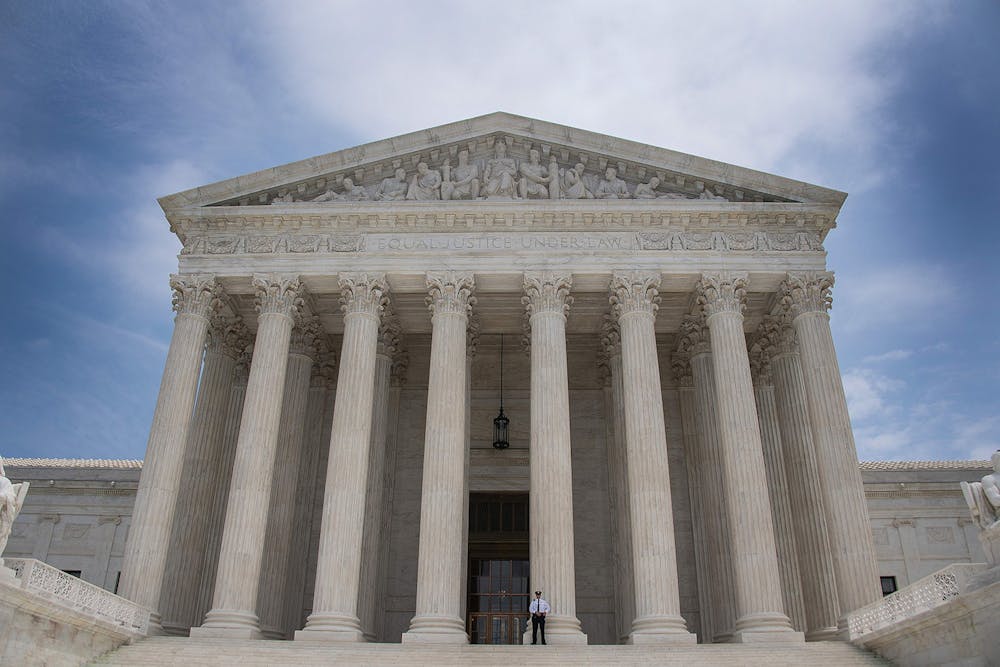The Supreme Court allowed the Trump administration on Monday to begin implementing a rule that makes it easier to deny immigrants residency or admission on the basis of them using or being likely to use public assistance programs.
The new rule expands the group of people considered to be “public charges,” meaning someone believed to be in primary and permanent dependence of the state. Existing laws allow the government to refuse green cards or visas for immigrants determined to be public charges or likely to become public charges in the future, according to the U.S. Citizenship and Immigration Services website.
The Supreme Court's 5-4 decision significantly expands the definition of "public charge," allowing the government to turn away far more migrants than previously possible.
The ruling is an insult to immigrants and represents another transgression by the Trump administration that will leave a mark on American history, and it especially targets low-income immigrants. We must protest against it.
The category of "public charge" has generally included people who need full-time elderly care or Medicaid, said IU international law professor Shruti Rana. However, it's now much broader.
“The new rule is intended to be a drastic expansion of the old one in several ways,” Rana said.
Instead of only covering people who are fully dependent on state programs, the expanded definition would also include people in non-primary need. Now, any temporary health programs, such as getting vaccinations and immunizations for children, can be considered state dependency.
Trump’s changes seem designed to deter the working class from considering immigration to U.S.
The new rule gives immigration officers much more discretion to make the final decision, according to Immigration Legal Resource Center. Officers might think someone will become a public charge at any time in the future for economic, education or health reasons.
The family members of people considered to be public charges could be affected, too. Immigration officers can consider an applicant being a relative of a public charge as indication that the applicant might also become one.
“It could be that a person might not need any state programs at all but somebody in their family might have, and this could be counted against them," Rana said.
Officers’ discretion was previously more limited. Immigration authorities had to decide whether applicants would immediately become public charges, Rana said.
Now, low-level officers have much greater ability to deny someone entry based on little actual evidence. The government could take a completely healthy elderly person and just say they might become dependent on Medicaid to keep the applicant out of the country. Healthy applicants with family histories of health issues could be rejected on the basis that they might become dependent on a state-provided healthcare program. It’s up to the discretion of the officer.
The new rule appears to directly target low-income immigrants who hope to bring their families and loved ones with them for a new life in the U.S.
But it goes far beyond merely targeting low-income people. The real intention is to drastically limit legal immigration without having to go through Congress and change immigration law.
The Trump administration and the Supreme Court are knowingly perpetuating false assumptions that immigrants are a burden on the state when we know that this is not true. This is about getting a stereotype out there that pushes the narrative that immigrants are a burden to America.
In reality, it is the opposite. This country was built upon the ideals of immigrants who were in pursuit of happiness and a better life. That’s why U.S. District Judge George B. Daniels called the legislation “repugnant to the American dream of the opportunity for prosperity and success through hard work and upward mobility” in his 24-page opinion on the ruling.
In his 1952 Pulitzer Prize-winning book "The Uprooted," Oscar Handlin wrote, "Once I thought to write a history of immigrants in America. Then I discovered that the immigrants are American history."
Trump and the Supreme Court should be reminded that immigrants are American history.
The Supreme Court’s decision will severely harm legal immigrants who have gone through all of the required processes to build a better future for themselves in America. Denying them this access directly contradicts the ideals that this nation was built upon. In response, we must protest the decision and Trump’s continuing transgressions against immigrants.
Kuzey Bektas (he/him) is a freshman studying physics & philosophy. He's an international student from Istanbul, Turkey.






